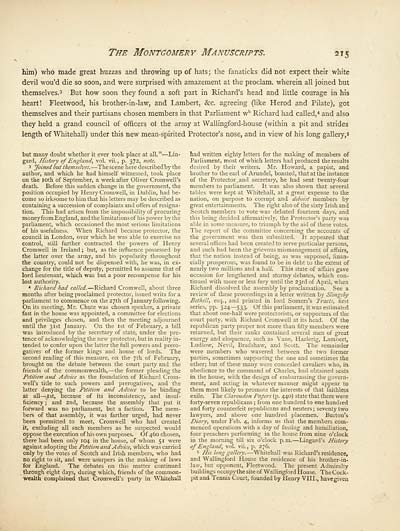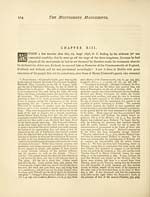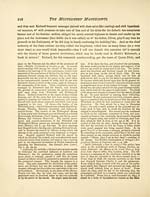Montgomery manuscripts
(229) Page 215
Download files
Complete book:
Individual page:
Thumbnail gallery: Grid view | List view

The Montgomery Manuscripts.
215
him) who made great huzzas and throwing up of hats; the fanaticks did not expect their white
devil wou'd die so soon, and were surprised with amazement at the proclam. wherein all joined but
themselves. 3 But how soon they found a soft part in Richard's head and little courage in his
heart! Fleetwood, his brother-in-law, and Lambert, &c. agreeing (like Herod and Pilate), got
themselves and their partisans chosen members in that Parliament w h Richard had called, 4 and also
they held a grand council of officers of the army at Wallingford-house (within a pit and strides
length of Whitehall) under this new mean-spirited Protector's nose, and in view of his long gallery,?
but many doubt whether it ever took place at all." — Lin-
gard, History of England, vol. vii. , p. 372, note.
3 yoined but themselves. — The scene here described by the
author, and which he had himself witnessed, took place
on the 10th of September, a week after Oliver Cromwell's
death. Before this sudden change in the government, the
position occupied by Henry Cromwell, in Dublin, had be-
come so irksome to him that his letters may be described as
containing a succession of complaints and offers of resigna-
tion. This had arisen from the impossibility of procuring
money from England, and the limitations of his power by the
parliament, which occasioned the most serious limitations
of his usefulness. When Richard became protector, the
council in London, over which he was able to exercise no
control, still further contracted the powers of Henry
Cromwell in Ireland ; but, as the influence possessed by
the latter over the army, and his popularity throughout
the country, could not be dispensed with, he was, in ex-
change for the title of deputy, permitted to assume that of
lord lieutenant, which was but a poor recompense for his
lost authority.
4 Richard had called. — Richard Cromwell, about three
months after being proclaimed protector, issued writs for a
parliament to commence on the 27th of January following.
On its meeting, Mr. Chute was chosen speaker, a private
fast in the house was appointed, a committee for elections
and privileges chosen, and then the meeting adjourned
until the 31st January. On the 1st of February, a bill
was introduced by the secretary of state, under the pre-
tence of acknowledging the new protector, but in reality in-
tended to confer upon the latter the full powers and prero-
gatives of the former kings and house of lords. The
second reading of this measure, on the 7th of February,
brought on the debate between the court party and the
friends of the commonwealth, — the former pleading the
Petition and Advice as the foundation of Richard Crom-
well's title to such powers and prerogatives, and the
latter denying the Petition and Advice to be binding
at all — -1st, because of its inconsistency, and insuf-
ficiency ; and 2nd, because the assembly that put it
forward was no parliament, but a faction. The mem-
bers of that assembly, it was farther urged, had never
been permitted to meet, Cromwell who had created
it, excluding all such members as he suspected would
oppose the execution of his own purposes. Of 460 chosen,
there had been only 104 in the house, of whom 51 were
against adopting the Petition and Advice, which was carried
only by the votes of Scotch and Irish members, who had
no right to sit, and were usurpers in the making of laws
for England. The debates on this matter continued
through eight days, during which, friends of the common-
wealth complained that Cromwell's party in Whitehall
had written eighty letters for the making of members of
Parliament, most of which letters had produced the results
desired by their writers. Mr. Howard, a papist, and
brother to the earl of Arundel, boasted, that at the instance
of the Protector. and secretary, he had sent twenty-four
members to parliament. It was also shown that several
tables were kept at Whitehall, at a great expense to the
nation, on purpose to corrupt and deboist members by
great entertainments. The right also of the sixty Irish and
Scotch members to vote was debated fourteen days, and
this being decided affirmatively, the Protector's party was
able in some measure, to triumph by the aid of these votes.
The report of the committee concerning the accounts of
the government was then submitted. It appeared that
several offices had been created to serve particular persons,
and such had been the grievous mismanagement of affairs,
that the nation instead of being, as was supposed, finan-
cially prosperous, was found to be in debt to the extent of
nearly two millions and a half. This state of affairs gave
occasion for lengthened and stormy debates, which con-
tinued with more or less fury until the 23rd of April, when
Richard dissolved the assembly by proclamation. See a
review of these proceedings in a letter written by Slingsby
Bethell, esq., and printed in lord Somers's Tracts, first
series, pp. 524 — 533. Of this parliament, it was estimated
that about one-half were protectorists, or supporters of the
court party, with Richard Cromwell at its head. Of the
republican party proper not more than fifty members were
returned, but their ranks contained several men of great
energy and eloquence, such as Vane, Hazlerig, Lambert,
Ludlow, Nevil, Bradshaw, and Scott. The remainder
were members who wavered between the two former
parties, sometimes supporting the one and sometimes the
other; but of these many were concealed cavaliers who, in
obedience to the command of Charles, had obtained seats
in the house, with the design of embarrassing the govern-
ment, and acting in whatever manner might appear to
them most likely to promote the interests of that faithless
exile. The Clarendon Papers (p. 440) state that there were
forty-seven republicans; from one hundred to one hundred
and forty counterfeit republicans and neuters ; seventy two
lawyers, and above one hundred placemen. Burton's
Diary, under Feb. 4, informs us that the members com-
menced operations with a day of fasting and humiliation,
four preachers performing in the house from nine o'clock
in the morning till six o'clock p.m. — Lingard's History
0/ England, vol. vii., p. 276.
5 His long gallery. — Whitehall was Richard's residence,
and Wallingford House the residence of his brother-in-
law, but opponent, Fleetwood. The present Admiralty
buildings occupy the site of Wallingford House. The Cock-
pit and Tennis Court, founded by Henry VIII., havegiven
215
him) who made great huzzas and throwing up of hats; the fanaticks did not expect their white
devil wou'd die so soon, and were surprised with amazement at the proclam. wherein all joined but
themselves. 3 But how soon they found a soft part in Richard's head and little courage in his
heart! Fleetwood, his brother-in-law, and Lambert, &c. agreeing (like Herod and Pilate), got
themselves and their partisans chosen members in that Parliament w h Richard had called, 4 and also
they held a grand council of officers of the army at Wallingford-house (within a pit and strides
length of Whitehall) under this new mean-spirited Protector's nose, and in view of his long gallery,?
but many doubt whether it ever took place at all." — Lin-
gard, History of England, vol. vii. , p. 372, note.
3 yoined but themselves. — The scene here described by the
author, and which he had himself witnessed, took place
on the 10th of September, a week after Oliver Cromwell's
death. Before this sudden change in the government, the
position occupied by Henry Cromwell, in Dublin, had be-
come so irksome to him that his letters may be described as
containing a succession of complaints and offers of resigna-
tion. This had arisen from the impossibility of procuring
money from England, and the limitations of his power by the
parliament, which occasioned the most serious limitations
of his usefulness. When Richard became protector, the
council in London, over which he was able to exercise no
control, still further contracted the powers of Henry
Cromwell in Ireland ; but, as the influence possessed by
the latter over the army, and his popularity throughout
the country, could not be dispensed with, he was, in ex-
change for the title of deputy, permitted to assume that of
lord lieutenant, which was but a poor recompense for his
lost authority.
4 Richard had called. — Richard Cromwell, about three
months after being proclaimed protector, issued writs for a
parliament to commence on the 27th of January following.
On its meeting, Mr. Chute was chosen speaker, a private
fast in the house was appointed, a committee for elections
and privileges chosen, and then the meeting adjourned
until the 31st January. On the 1st of February, a bill
was introduced by the secretary of state, under the pre-
tence of acknowledging the new protector, but in reality in-
tended to confer upon the latter the full powers and prero-
gatives of the former kings and house of lords. The
second reading of this measure, on the 7th of February,
brought on the debate between the court party and the
friends of the commonwealth, — the former pleading the
Petition and Advice as the foundation of Richard Crom-
well's title to such powers and prerogatives, and the
latter denying the Petition and Advice to be binding
at all — -1st, because of its inconsistency, and insuf-
ficiency ; and 2nd, because the assembly that put it
forward was no parliament, but a faction. The mem-
bers of that assembly, it was farther urged, had never
been permitted to meet, Cromwell who had created
it, excluding all such members as he suspected would
oppose the execution of his own purposes. Of 460 chosen,
there had been only 104 in the house, of whom 51 were
against adopting the Petition and Advice, which was carried
only by the votes of Scotch and Irish members, who had
no right to sit, and were usurpers in the making of laws
for England. The debates on this matter continued
through eight days, during which, friends of the common-
wealth complained that Cromwell's party in Whitehall
had written eighty letters for the making of members of
Parliament, most of which letters had produced the results
desired by their writers. Mr. Howard, a papist, and
brother to the earl of Arundel, boasted, that at the instance
of the Protector. and secretary, he had sent twenty-four
members to parliament. It was also shown that several
tables were kept at Whitehall, at a great expense to the
nation, on purpose to corrupt and deboist members by
great entertainments. The right also of the sixty Irish and
Scotch members to vote was debated fourteen days, and
this being decided affirmatively, the Protector's party was
able in some measure, to triumph by the aid of these votes.
The report of the committee concerning the accounts of
the government was then submitted. It appeared that
several offices had been created to serve particular persons,
and such had been the grievous mismanagement of affairs,
that the nation instead of being, as was supposed, finan-
cially prosperous, was found to be in debt to the extent of
nearly two millions and a half. This state of affairs gave
occasion for lengthened and stormy debates, which con-
tinued with more or less fury until the 23rd of April, when
Richard dissolved the assembly by proclamation. See a
review of these proceedings in a letter written by Slingsby
Bethell, esq., and printed in lord Somers's Tracts, first
series, pp. 524 — 533. Of this parliament, it was estimated
that about one-half were protectorists, or supporters of the
court party, with Richard Cromwell at its head. Of the
republican party proper not more than fifty members were
returned, but their ranks contained several men of great
energy and eloquence, such as Vane, Hazlerig, Lambert,
Ludlow, Nevil, Bradshaw, and Scott. The remainder
were members who wavered between the two former
parties, sometimes supporting the one and sometimes the
other; but of these many were concealed cavaliers who, in
obedience to the command of Charles, had obtained seats
in the house, with the design of embarrassing the govern-
ment, and acting in whatever manner might appear to
them most likely to promote the interests of that faithless
exile. The Clarendon Papers (p. 440) state that there were
forty-seven republicans; from one hundred to one hundred
and forty counterfeit republicans and neuters ; seventy two
lawyers, and above one hundred placemen. Burton's
Diary, under Feb. 4, informs us that the members com-
menced operations with a day of fasting and humiliation,
four preachers performing in the house from nine o'clock
in the morning till six o'clock p.m. — Lingard's History
0/ England, vol. vii., p. 276.
5 His long gallery. — Whitehall was Richard's residence,
and Wallingford House the residence of his brother-in-
law, but opponent, Fleetwood. The present Admiralty
buildings occupy the site of Wallingford House. The Cock-
pit and Tennis Court, founded by Henry VIII., havegiven
Set display mode to:
![]() Universal Viewer |
Universal Viewer | ![]() Mirador |
Large image | Transcription
Mirador |
Large image | Transcription
Images and transcriptions on this page, including medium image downloads, may be used under the Creative Commons Attribution 4.0 International Licence unless otherwise stated. ![]()
| Histories of Scottish families > Montgomery manuscripts > (229) Page 215 |
|---|
| Permanent URL | https://digital.nls.uk/95235675 |
|---|
| Description | A selection of almost 400 printed items relating to the history of Scottish families, mostly dating from the 19th and early 20th centuries. Includes memoirs, genealogies and clan histories, with a few produced by emigrant families. The earliest family history goes back to AD 916. |
|---|

